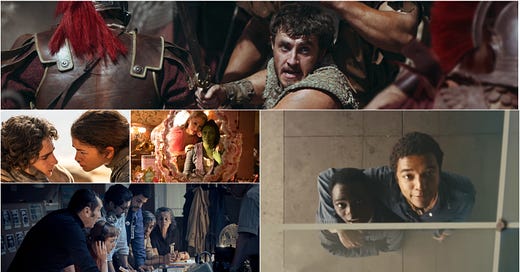The Downside Of An Awards Season Dominated By Blockbusters And Franchise-Friendly Tentpoles
When studios earn fortune *and* glory from their franchise-friendly blockbusters, there's little incentive to offer smaller, prestige-chasing films that now mostly exist for year-end Oscar contention.
Tim Fehlbaum’s September 5 is a pretty good example of history retold from a specific perspective. Bemusingly, the Paramount picture opens the same weekend as Amazon MGM Studios’ Nickel Boys. One of the year’s more visually inventive and emotionally impactful pictures, RaMell Ross’ adaptation of Colson Whitehead’s novel focuses on two young Black boys (Ethan Herisse and Brandon Wilson) bonding amid wrongful imprisonment at an abusive juvenile reform school. It’s a sadly oft-told tale, with the gimmick (not a criticism) being that the film unspools from the first-person point-of-view of its participants. Think, with all due respect, something akin to Hardcore Henry but using its first-person perspective for much more than just mimicking violent video games. It’s an exciting film, not just because of a terrific supporting turn from Aunjanue Ellis-Taylor, but also in using the cinematic language in a new, or at least less-frequent way. Without getting into “better” or “worse,” Nickel Boys would make an interesting double bill with September 5 or even Robert Zemeckis’ (unflinchingly depressing in its own way) Here.
September 5 is more conventional regarding perspective (primarily white male journalists) and cinematic language. It retells a historical moment from a specific and arguably isolating viewpoint. The Peter Sarsgaard/John Magaro/Ben Chaplin drama showcases the sports journalists covering the 1972 Olympic Games who had to become different kinds of breaking news reporters when PLO militants kidnapped the Israeli athletes. The event, sometimes considered the birth of modern Middle Eastern terrorism, unfolds mostly in third-hand or as-it-happens snippets from the perspective of the reporters who covered the story while addressing unprecedented questions about what could or should be shown on television or what responsibility they had for breaking news about in-progress crimes being consumed by the criminals. Like Nickel Boys, it offers a comparative offhand subtly in depicting or suggesting unthinkable violence, which only enhances the impact. The 94-minute September 5 succeeds as a riveting “you are there” docudrama, working on a level not unlike any number of “found footage” films or a “macro-sized events from a micro-sized perspective” genre flick like M. Night Shyamalan’s Signs.
Yes, I could take issue with what the film means, especially in how it somewhat glosses over an inexcusable journalistic fumble. But it works as rubber-band-ish, trip-wire historical entertainment. Like Nightbitch, it’s just a good movie from when that used to be enough. Again, I like the idea of Paramount releasing its own buzzy, non-tentpole awards season contender and would like to see that sort of thing happen more often so that the Academy Awards season isn’t just (comparatively) dominated by A24, Neon, (the Disney-owned) Searchlight and (the Comcast-owned) Focus Features. And yet, in a rather tragic irony, September 5’s Oscar prospects have taken a sharp dive in the last few weeks for reasons having little to do with the movie itself. Simply put, Paramount has a new #1 awards season contender on its plate. It’s not another year-end prestige flick but Ridley Scott’s $250 million Gladiator II. Yes, Gladiator won Best Picture in 2001, but do the Oscars really need an Academy Awards season dominated by “were going to get made anyway” tentpoles?





